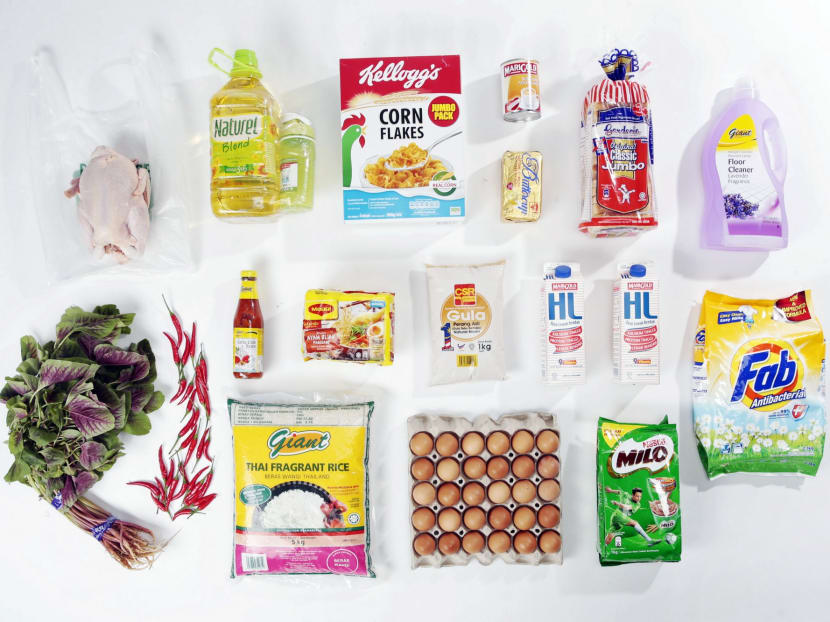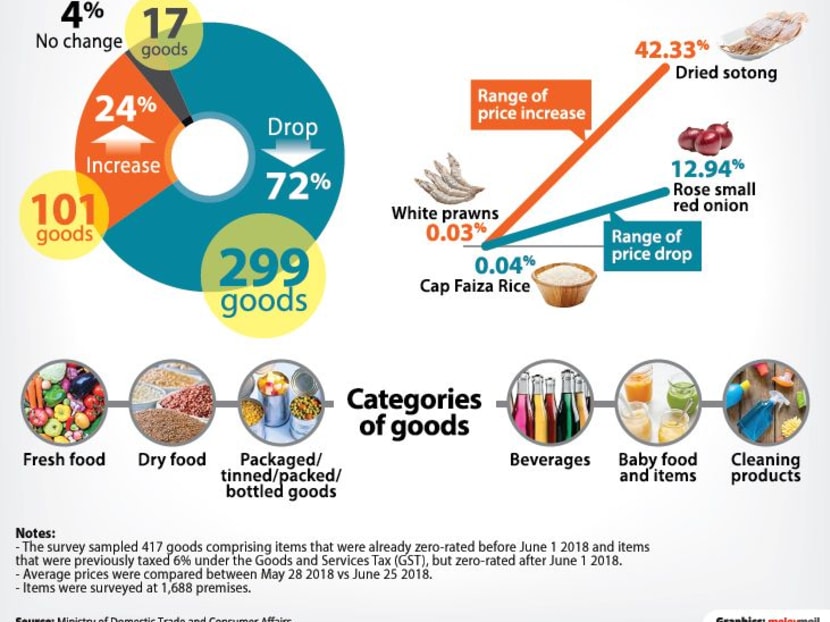Over 7 in 10 goods cheaper after GST abolished: M'sian govt survey
PUTRAJAYA — The average prices of 72 per cent of necessities dropped after Malaysia's new Pakatan Harapan (PH) government zero-rated everything under the Goods and Services Tax (GST), with the rate of decrease ranging between less than 1 per cent and about 13 per cent, an official survey has shown.

Dr Mahathir Mohamad's coalition had pledged to replace the GST — which disgruntled voters blamed for their rising living costs since it was imposed in 2015 — with a more modest sales-and-services levy.
PUTRAJAYA — The average prices of 72 per cent of necessities dropped after Malaysia's new Pakatan Harapan (PH) government zero-rated everything under the Goods and Services Tax (GST), with the rate of decrease ranging between less than 1 per cent and about 13 per cent, an official survey has shown.
The survey by the National Price Council under Malaysia's Ministry of Domestic Trade and Consumer Affairs found that complaints of prices increasing or remaining the same, despite the PH government effectively abolishing the GST from June 1, were mainly about food and drinks at eateries.
“Complaints were focused on food and drink prices, mostly at restaurants and ‘warungs’,” Domestic Trade and Consumer Affairs Minister Datuk Saifuddin Nasution Ismail said on Wednesday (July 4).
In the run up to the May 9 election, Dr Mahathir Mohamad's PH coalition had pledged to replace the GST — which disgruntled voters blamed for their rising living costs since it was imposed in 2015 — with a more modest sales-and-services levy.
Economists and credit-ratings companies like Moody's Investors Service have warned the move would cut government income and widen the budget deficit if not offset by other revenue-raising measures. The Malaysian government earned RM43.8 billion (S$14.84 billion) in revenue from the GST last year, or 18.3 per cent of tax income, making it the largest contributor after corporate tax receipts.
The survey also found that 97 per cent of goods previously taxed 6 per cent under the GST but zero-rated from June 1 experienced price drops. The rate of decline ranged from 0.87 per cent to 8.12 per cent.
For goods that were already zero-rated before June 1, the prices of 56 per cent of them fell, with the rate of decrease ranging between 0.04 per cent and 12.94 per cent.
When both types of goods were combined, the survey showed that the range of an average drop in prices was between 0.04 per cent for Cap Faiza Rice and 12.94 per cent for Rose small red onions.
A total of 24 per cent of consumer goods sampled showed price hikes, with the rate of increase ranging from 0.03 per cent for white prawns to 42.33 per cent for dried squid. The prices of four per cent of goods sampled remained the same.
Mr Saifuddin explained that the price increases were mostly for fresh food like seafood and vegetables that followed supply and demand.
The survey sampled 417 consumer goods from 1,688 premises comprising items that were already zero-rated before June 1 and those that were previously taxed 6 percent under the GST, but zero-rated from June 1.
The necessities sampled were fresh and dry food; packaged, tinned, packed, or bottled products; beverages; baby food and items; and cleaning products.
Average prices were compared on May 28 versus June 25 this year.

From June 1 to June 30, the ministry recorded 968 complaints about prices not falling and 1,023 complaints that goods were becoming more expensive.
The ministry found that half of the complaints received last month related to food and drinks.
The most complained-about premises were restaurants and cafeterias at 42 per cent. Supermarkets were the target of 15 per cent of complaints.
“Businesses must be ethical,” Mr Saifuddin said.
He added that last month, authorities from the ministry checked 24,601 premises and examined 646,377 items. A total of 375 warnings were issued if prices of goods remained.
The minister stressed, however, that he would not be antagonistic towards businesses and would seek to “educate” them instead.
Mr Saifuddin also said he would conduct mapping on various premises in different states as cost of living differed between urban and rural areas.
“If you say prices drop in Petaling Jaya, that’s different from Kubang Kerian,” he said.
When asked if prices of goods would rise again after the Sales and Services Tax (SST) comes into effect on September 1, Mr Saifuddin said price movements would be impacted, but any rise or fall would depend on the rate that has yet to be decided. MALAY MAIL






